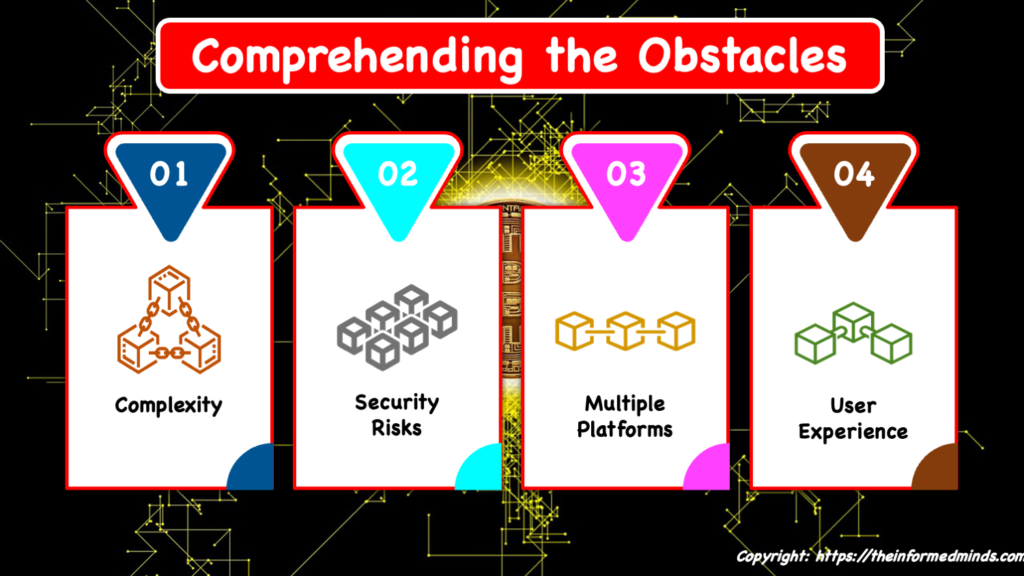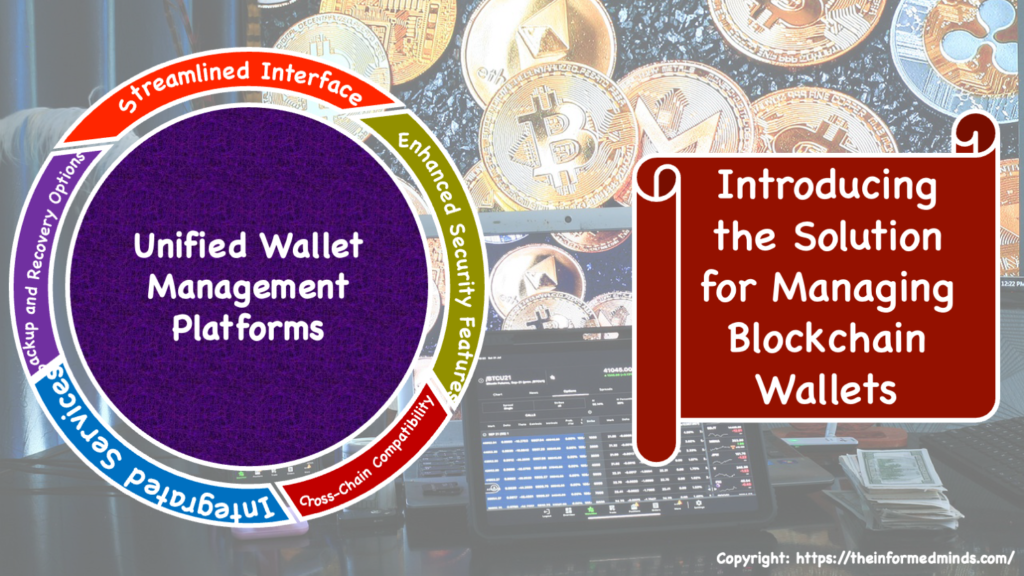To Share is to Show You Care!
In the realm of blockchain technology, managing wallets efficiently is paramount for seamless transactions and secure asset storage. However, many individuals encounter challenges in creating and managing wallets effectively. From security concerns to the complexity of the process, the journey of handling blockchain wallets can be daunting. Fortunately, innovative solutions have emerged to streamline this process, offering simplicity and convenience to users worldwide.
1. Understanding the Challenges
Before delving into the solution, let’s examine the key difficulties associated with creating and managing blockchain wallets:

1.1 Complexity
- Traditional wallet creation processes often involve technical steps like generating private keys and mnemonic phrases.
- For newcomers to the blockchain space, understanding these technicalities can be overwhelming and discouraging.
- Without proper guidance and simplified processes, users may feel intimidated and hesitant to engage with blockchain technology.
1.2 Security Risks
- Managing private keys and seed phrases is crucial for wallet security.
- However, storing these keys securely can be challenging, especially for non-technical users.
- The risk of losing or compromising private keys due to human error or security breaches is a significant concern in blockchain wallet management.
1.3 Multiple Platforms
- With the proliferation of blockchain networks and cryptocurrencies, users often need to manage wallets across various platforms.
- Each blockchain network may have its unique wallet setup and management procedures, leading to confusion and inefficiency.
- Switching between different platforms to manage diverse portfolios adds complexity and consumes valuable time and resources.
1.4 User Experience
- Clunky interfaces and unintuitive navigation hinder the user experience of blockchain wallet management.
- Poorly designed wallets may lack essential features, making it challenging for users to perform basic functions effectively.
- A subpar user experience discourages adoption and limits the growth of the blockchain ecosystem.
2. Introducing the Solution
To address these challenges, a revolutionary solution has emerged, offering simplicity and security in blockchain wallet management:
Unified Wallet Management Platforms
These platforms provide a one-stop solution for creating, managing, and securing blockchain wallets across multiple networks. Here’s how they simplify the process:

2.1 Streamlined Interface
- Unified platforms offer intuitive interfaces that guide users through the wallet creation and management process.
- Clear instructions and simplified workflows eliminate confusion and reduce the learning curve for users.
- Intuitive design elements enhance user experience and encourage engagement with blockchain technology.
2.2 Enhanced Security Features
- Unified platforms prioritize security by implementing robust encryption protocols and multi-factor authentication mechanisms.
- Integration with hardware wallets adds an extra layer of protection, safeguarding users’ assets against unauthorized access and cyber threats.
- Secure backup and recovery options ensure that users can regain access to their wallets in the event of loss or device failure.
2.3 Cross-Chain Compatibility
- Unified platforms support multiple blockchain networks and cryptocurrencies, offering users a single interface to manage diverse portfolios.
- Seamless integration with different blockchains eliminates the need for users to navigate multiple platforms, simplifying asset management.
2.4 Backup and Recovery Options
- Advanced backup and recovery features enable users to securely store and retrieve their private keys and mnemonic phrases.
- Flexible recovery options mitigate the risk of data loss and provide peace of mind to users concerned about wallet security.
2.5 Integrated Services
- Some unified platforms offer additional services such as decentralized exchange integration and portfolio tracking.
- These integrated services enhance the functionality of the wallet management platform, providing users with comprehensive tools to manage their digital assets effectively.
3. The Benefits
Embracing a unified wallet management solution offers a myriad of benefits to both novice and experienced users:

3.1 Simplicity
- Unified wallet management platforms simplify the process of creating and managing blockchain wallets, making it accessible to users of all skill levels.
- Intuitive interfaces and streamlined workflows reduce friction and encourage broader adoption of blockchain technology.
3.2 Security
- Enhanced security features protect users’ assets from unauthorized access and cyber threats, fostering trust and confidence in the blockchain ecosystem.
- Robust encryption protocols and secure backup mechanisms safeguard against data loss and ensure the integrity of users’ digital assets.
3.3 Convenience
- Centralized management across multiple blockchain networks saves time and effort for users, enabling seamless transactions and asset monitoring.
- Eliminating the need to switch between different platforms enhances efficiency and improves the overall user experience.
3.4 Versatility
- Cross-chain compatibility allows users to manage diverse portfolios across various blockchain ecosystems, unlocking new opportunities and expanding their investment options.
- Access to integrated services enhances the functionality of the wallet management platform, providing users with valuable tools to optimize their digital asset management strategies.
Conclusion
In conclusion, the emergence of unified wallet management platforms represents a significant milestone in the evolution of blockchain technology. By addressing the complexities and challenges associated with wallet creation and management, these solutions empower users to navigate the blockchain landscape with confidence and ease. As the blockchain ecosystem continues to evolve, embracing innovative solutions will play a pivotal role in driving mainstream adoption and unlocking the full potential of decentralized finance.
With unified wallet management platforms, the journey towards seamless blockchain transactions and secure asset storage has never been more attainable. Embrace simplicity, prioritize security, and embark on a transformative journey in the world of blockchain wallet management.
Frequently Asked Questions
Q1: What is the new blockchain in 2024?
A: In 2024, one of the new blockchain platforms gaining traction is Solana. Solana distinguishes itself with its high throughput and low transaction costs, making it a promising contender in the blockchain space.
Q2: Where will blockchain technology be in 5 years?
A: In the next five years, blockchain technology is expected to become more integrated into various industries, revolutionizing processes like supply chain management, healthcare record-keeping, and decentralized finance. Interoperability between different blockchains may also improve, fostering greater collaboration and innovation.
Q3: How blockchain technology will change the future?
A: Blockchain technology has the potential to revolutionize various aspects of society by enhancing transparency, security, and efficiency in transactions and data management. It could transform industries such as finance, healthcare, logistics, and governance, paving the way for a more decentralized and trustless future.
Q4: What is the difference between a blockchain wallet and a crypto wallet?
A: A blockchain wallet is a software application that allows users to interact with a blockchain network by managing their digital assets, such as cryptocurrencies. A crypto wallet, on the other hand, specifically refers to a type of blockchain wallet designed for storing, sending, and receiving cryptocurrencies.
Q5: What is the fastest blockchain in 2024?
A: As of 2024, Solana is recognized as one of the fastest blockchain platforms, capable of processing thousands of transactions per second with minimal latency. Its high throughput and low fees make it attractive for developers and users alike.
Q6: Which crypto will boom in 2024?
A: Predicting specific cryptocurrencies that will boom in 2024 is challenging due to the volatile nature of the market. However, cryptocurrencies with strong fundamentals, innovative technology, and widespread adoption potential may see significant growth in the coming years.
Q7: Is blockchain still relevant in 2024?
A: Yes, blockchain technology remains highly relevant in 2024 and is expected to continue shaping various industries and processes. Its ability to provide decentralized, transparent, and secure solutions makes it indispensable in sectors like finance, supply chain, healthcare, and beyond.
Q8: What is the next big thing in blockchain?
A: The next big thing in blockchain could involve advancements in scalability, interoperability, and sustainability. Projects focusing on cross-chain communication, layer 2 scaling solutions, and environmental sustainability are gaining attention as the technology evolves.
Q9: How big is the blockchain market in 2024?
A: The size of the blockchain market in 2024 is projected to be substantial, with estimates varying depending on factors such as industry adoption and technological advancements. However, it is expected to be in the billions of dollars, encompassing various sectors and applications.
Q10: How will blockchain change everyday life?
A: Blockchain technology has the potential to simplify everyday transactions, enhance security and privacy, and empower individuals with greater control over their data and finances. It may streamline processes such as payments, identity verification, and asset management, ultimately improving efficiency and transparency in daily activities.
Q11: How will blockchain impact society?
A: Blockchain technology can foster trust, transparency, and inclusivity in society by decentralizing systems of governance, finance, and information exchange. It may promote financial inclusion, protect human rights, and enable new forms of collaboration and innovation across communities and borders.
Q12: How will blockchain change the economy?
A: Blockchain has the potential to disrupt traditional economic systems by reducing friction, intermediaries, and transaction costs. It may enable new business models, enhance market efficiency, and democratize access to financial services, ultimately reshaping the global economy towards decentralization and innovation.
Q13: Which wallet is best for blockchain?
A: The best wallet for blockchain depends on factors such as security features, user experience, and compatibility with specific blockchain networks. Popular options include hardware wallets like Ledger and Trezor, software wallets like MetaMask and Trust Wallet, and mobile wallets provided by blockchain platforms themselves.
Q14: How safe is blockchain wallet?
A: Blockchain wallets can be secure if users follow best practices such as using hardware wallets, enabling two-factor authentication, and keeping their private keys secure. However, like any digital system, blockchain wallets are susceptible to risks such as phishing attacks, malware, and human error.
Q15: What is the nonce in the blockchain?
A: In blockchain technology, a nonce is a number added to a block’s hash during the mining process to produce a hash value that meets the difficulty target. Miners increment the nonce value until they find a hash that satisfies the consensus rules of the blockchain network, allowing them to create new blocks and secure the network.
The Informed Minds
I'm Vijay Kumar, a consultant with 20+ years of experience specializing in Home, Lifestyle, and Technology. From DIY and Home Improvement to Interior Design and Personal Finance, I've worked with diverse clients, offering tailored solutions to their needs. Through this blog, I share my expertise, providing valuable insights and practical advice for free. Together, let's make our homes better and embrace the latest in lifestyle and technology for a brighter future.

